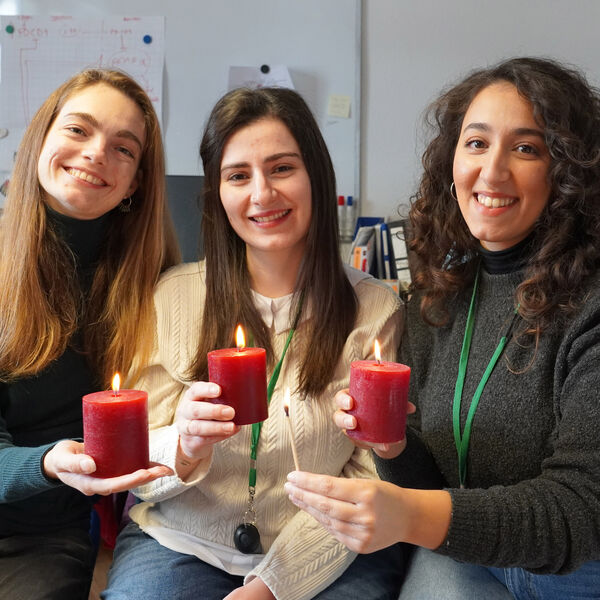
Our fourth advent story
The Greek language of love
In Greece, Christmas is above all a celebration of family and sumptuous food, just like here. "Cooking and eating together is a love language for us," explain the three doctoral students Georgia Daraki, Giannoula Savvou and Stavroula Litsiou. They come from different regions of Greece - Georgia from Athens (east-central Greece), Giannoula from Ioannina (north-west) and Stavroula from Karditsa (central Greece). Nevertheless, they discover many similarities in conversation. They agree that "food is a love language". "If we want to thank someone, we bring them food," Georgia (Morrison research group) confirms the general meaning in Greece. And then they list the must-haves for Christmas:
- Melomakarona (Christmas cookies with honey)
- Kourabiedes (butter cookies with powdered sugar)
- Diples (honey pastry dessert)
- and Vasilopita (New Year's cake).
Opinions differ as to which is the best dessert. "There are really two groups - one favors the melomakarona, the other the kourabiedes," they say with a laugh. Another part of the tradition is to meet up with all family members, relatives and friends.
There are many traditional customs in Greece - many more than in this country. Here is just a selection:
- From December 25 to January 6, the so-called twelve days, public fires are still lit in some places according to ancient custom to keep pagan shadow creatures that come from the underworld away from homes.
"It is said that they come into houses, steal, play tricks, plaster the food, leave dirt and chaos behind," says Stavroula (Waskow research group), describing the old folklore surrounding the goblins, "but they are harmless and don't hurt anyone."
- As a seafaring nation, it was long customary to decorate boats with fairy lights to light the way home for sailors. In some coastal towns, small illuminated boats are still placed on windowsills.
"In the meantime, the Christmas tree has also found its way into our home as an alternative," notes Giannoula (Waskow research group).
- The singing of the Kalanda, the traditional Christmas carol, takes place three times. On December 24, 31 and January 6, groups of children go from house to house with a triangle, singing songs and receiving sweets in return.
- On 6 January, the day Jesus was baptized in the River Jordan, crosses are thrown into the water everywhere - whether on a lake or by the sea. The person who picks up the cross will be blessed the following year.
"There is another tradition that brings good luck," adds Giorgia. "A coin is hidden in the New Year's cake Vasilopita, named after St. Vassili (the Greek Santa Claus). Whoever finds it in their piece will be lucky."
Giannoula and Georgia will be spending Christmas away from home for the first time this year. "But we're not alone, we're celebrating with friends," they both explain. Stavroula is also looking forward to celebrating in her home town not only traditionally, with her family, but also with her friends.
They wish everyone a "Kala Christougenna kai Kali Protochronia” (Merry Christmas and a Happy New Year)!








